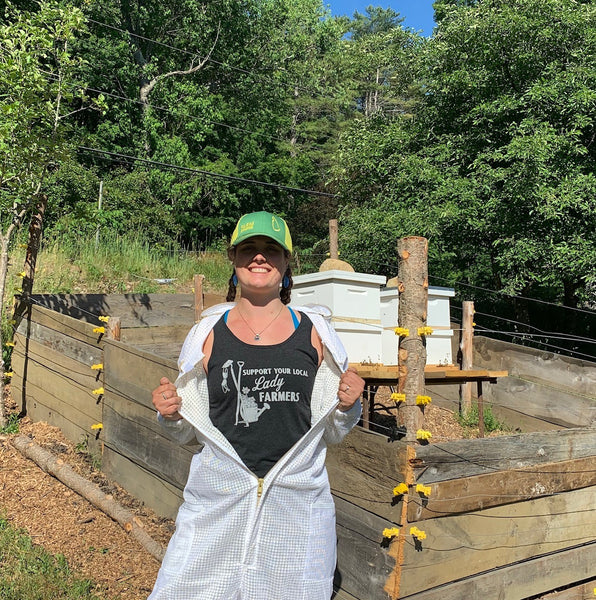
Jessica Metz in our Support Your Local Lady Farmers Tank
____
How did you get into farming?
I grew up working. Not only did I excel academically and at several high school sports, but I also held down a part-time job starting at the age of 13. I worked on an agriculture farm for the next 10 years, full time in the summer, part-time in the shoulder seasons. Even though it was the hardest work I had ever done, my back hurt, my hands and feet were constantly filthy, and I was occasionally in trouble for this or that, I absolutely loved working there. #crossroadfarm The idea of producing my own food, seeing where it was coming from, and all the work it took, really blew me away. I’ve always understood the importance of work. When I went to college, it was important to me to get a degree in a trade, something I knew I could get a job when I graduated. For me, that was nursing school. So off I went, leaving my passion for growing food in my tracks. Several years later, after relocating, I settled in a very small house on a small parcel of land. My now fiancé and I started thinking about what our goals were. We wanted to raise our own food for so many reasons and thought if we're raising food for us, we might as well raise a bit more for the community. We also decided we'd raise the poultry on pasture, supplementing with grain AND process them all ourselves as allowed by a New Hampshire State Exemption.
We dove in head first that year by purchasing 350 cornish cross meat chickens, 50 turkeys, and 8 piglets. We also had a 100 ft by 30 ft garden to grow all the veggies we could need, all while holding down 2 full-time jobs; Doug is a carpenter and I an oncology nurse. Good thing we weren't shy of hard work.
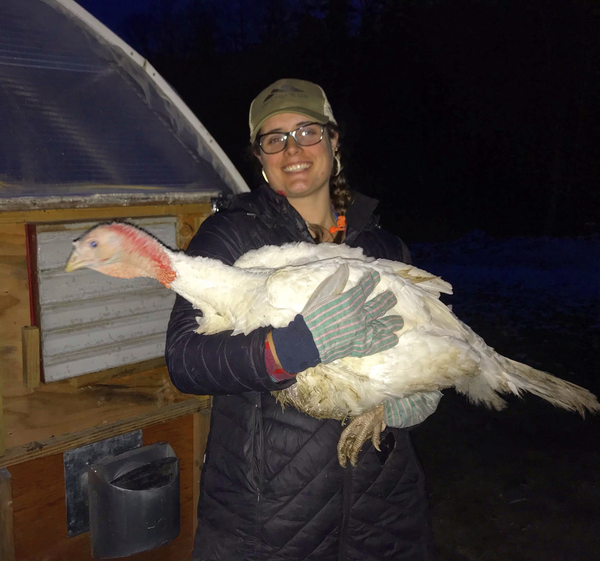
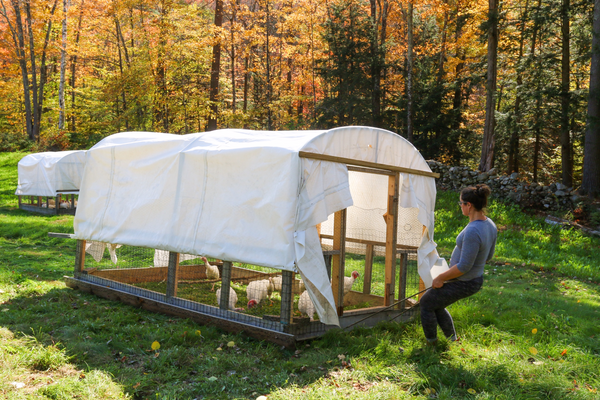
What are some of the biggest challenges you face as a farmer?
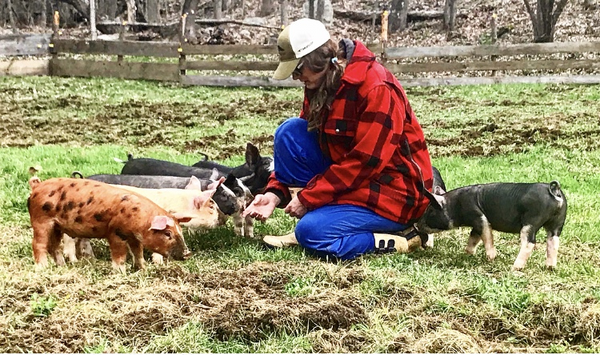
There are so many ways to farm that make it unique and special. In the eyes of the public, farmers are grouped into one, regardless of their size, product they farm, impact on the environment, or the sustainability of their practices. To top that off, animals can’t speak for themselves and though farmers try to advocate for them, they’ve been made the scapegoat for climate change. The third piece to this puzzle is that humans tend to want to give blame away rather than looking inward and working on self-change. Though I don’t agree, it’s much easier to blame a cow for our climate change concerns than it is to look inward at one's own life and put forth meaningful change to reduce environmental impact.
What are some misconceptions you hear about farming and agriculture when it comes to climate change that you'd like to address?
All of it!! I’d like to empower people to check their statistics. Instead of hearing a fact and regurgitating it back to a farmer, whose methods and reasons for those methods, you know nothing about. Do some digging. Where did the information come from? Who performed the study? Was their bias? I see this in healthcare too, the media tends to take pieces of a study and make a headline that will attract attention, get likes, and shares when often the take-home message is completely missed.
Also, it’s ok to be working on it or in process. It's ok to not be perfect. It’s ok to have identified areas of improvement but not be able to make the change just yet. The first step to any change is to assess the situation and identify strategies for improvement. Mitigating climate change does not happen overnight, it takes thinking about your local community but also involves taking action to decrease your global footprint. Then comes the hard work, make a plan, gather money and resources, it all takes time. We’re all just a work in progress.
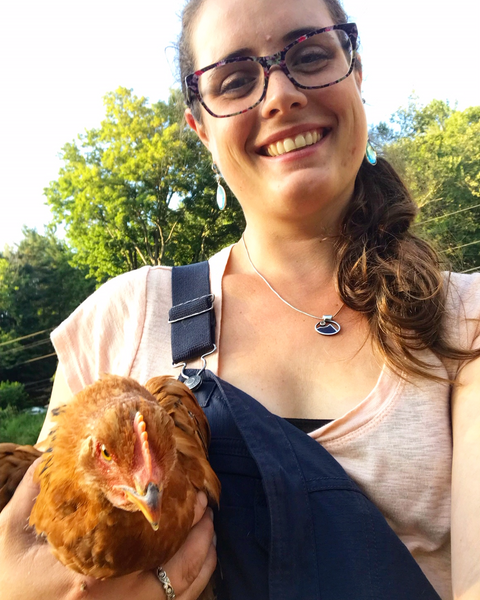
What future are you farming for and how do you think your farm can make a difference?
I farm to promote kindness, kindness to our animals, our neighbors, and to our environment. Our philosophy is to give our animals the best life they can live with only one bad day. We treat them with respect and honor while at the same time raising them in a way that improves and nourishes the land and community we live in, equally beneficial to all. We believe in small scale, sustainable practices and think this is the route to improving climate change. Small farms, spread more equally, means your food isn’t coming from across the country, it means you might even get to know your farmer and where your food comes from.
I grew up working. Not only did I excel academically and at several high school sports, but I also held down a part-time job starting at the age of 13. I worked on an agriculture farm for the next 10 years, full time in the summer, part-time in the shoulder seasons. Even though it was the hardest work I had ever done, my back hurt, my hands and feet were constantly filthy, and I was occasionally in trouble for this or that, I absolutely loved working there. #crossroadfarm The idea of producing my own food, seeing where it was coming from, and all the work it took, really blew me away. I’ve always understood the importance of work. When I went to college, it was important to me to get a degree in a trade, something I knew I could get a job when I graduated. For me, that was nursing school. So off I went, leaving my passion for growing food in my tracks. Several years later, after relocating, I settled in a very small house on a small parcel of land. My now fiancé and I started thinking about what our goals were. We wanted to raise our own food for so many reasons and thought if we're raising food for us, we might as well raise a bit more for the community. We also decided we'd raise the poultry on pasture, supplementing with grain AND process them all ourselves as allowed by a New Hampshire State Exemption.
We dove in head first that year by purchasing 350 cornish cross meat chickens, 50 turkeys, and 8 piglets. We also had a 100 ft by 30 ft garden to grow all the veggies we could need, all while holding down 2 full-time jobs; Doug is a carpenter and I an oncology nurse. Good thing we weren't shy of hard work.
____

____
Our year 1 lessons learned included:
Our year 1 lessons learned included:
1. The best place to set up your poultry brooder is probably not in your basement.
2. Having and caring for animals causes worry, lack of sleep, and general sickness or escapies happen in the worst of times.
3. Growing and raising your own food is really, so incredibly awesome, but it takes immense time, effort, and resources.
____

_____
What are some of the biggest challenges you face as a farmer?
I’m not sure I can name just one. As a new farmer without much in the way of infrastructure, business sense, or funding, we struggle to make advancements in our big projects and general maintenance. When you raise animals, their needs always come first, no matter what. By the time we get done moving chicken tractors, feeding and watering everyone, and prepping for harvest time, it’s 10 pm and the farmers are in need of food themselves. So the roof on our barn remains unfinished and countless projects aren't completed or even started yet, but in the end we raise some pretty happy, kick-ass animals. It’s a challenge I don't see going away any time soon, with each year we chip away little by little by little.
I also struggle with the marketing and selling of our products at times. I full-heartedly support any and all farmers and truly believe raising food for the public is never easy on any scale, however, I find it difficult to market and sell my product when it’s 4 times the cost of the grocery store alternative. I understand why; the time and effort put in moving birds to new pasture every single day, use of organic grain, product quality, and taste, and arguably most importantly, paying the environment back instead of costing it. These are all factors that go into the cost of our products that not everyone understands. My challenge comes when trying to justify my cost, point out the differences in how the animals are raised, and why you should pay more for this product without creating shame, blame, or hard feelings, because truly, all farmers are hard-working, care for their animals, and in my experience, are just generally pretty amazing.
____

____
What are your thoughts and beliefs on farming in the face of climate change?
There are so many ways to farm that make it unique and special. In the eyes of the public, farmers are grouped into one, regardless of their size, product they farm, impact on the environment, or the sustainability of their practices. To top that off, animals can’t speak for themselves and though farmers try to advocate for them, they’ve been made the scapegoat for climate change. The third piece to this puzzle is that humans tend to want to give blame away rather than looking inward and working on self-change. Though I don’t agree, it’s much easier to blame a cow for our climate change concerns than it is to look inward at one's own life and put forth meaningful change to reduce environmental impact.
____
What are some misconceptions you hear about farming and agriculture when it comes to climate change that you'd like to address?
All of it!! I’d like to empower people to check their statistics. Instead of hearing a fact and regurgitating it back to a farmer, whose methods and reasons for those methods, you know nothing about. Do some digging. Where did the information come from? Who performed the study? Was their bias? I see this in healthcare too, the media tends to take pieces of a study and make a headline that will attract attention, get likes, and shares when often the take-home message is completely missed.
Also, it’s ok to be working on it or in process. It's ok to not be perfect. It’s ok to have identified areas of improvement but not be able to make the change just yet. The first step to any change is to assess the situation and identify strategies for improvement. Mitigating climate change does not happen overnight, it takes thinking about your local community but also involves taking action to decrease your global footprint. Then comes the hard work, make a plan, gather money and resources, it all takes time. We’re all just a work in progress.
____

____
What future are you farming for and how do you think your farm can make a difference?
I farm to promote kindness, kindness to our animals, our neighbors, and to our environment. Our philosophy is to give our animals the best life they can live with only one bad day. We treat them with respect and honor while at the same time raising them in a way that improves and nourishes the land and community we live in, equally beneficial to all. We believe in small scale, sustainable practices and think this is the route to improving climate change. Small farms, spread more equally, means your food isn’t coming from across the country, it means you might even get to know your farmer and where your food comes from.
____
Where can we follow along and support you?
Website: www.metzmeats.com
Instagram: @metzmeats

